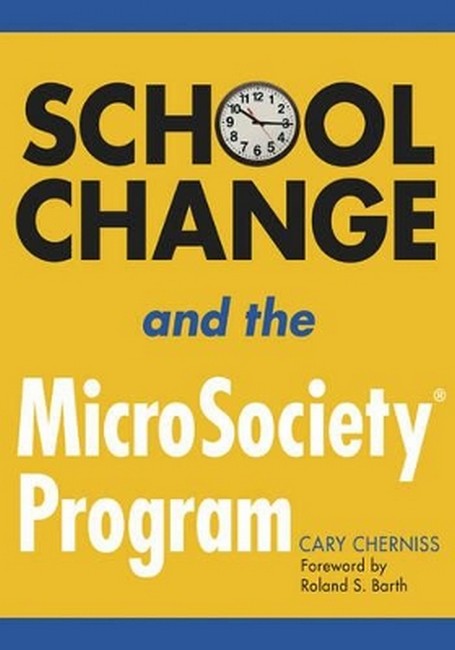Cary Cherniss currently is Professor of Applied Psychology and Director of the Organizational Psycho-logy Program in the Graduate School of Applied and Professional Psychology at Rutgers University. He also has taught at the University of Michigan in Ann Arbor, the University of Illinois in Chicago, the Chicago Medical School, and the Illinois Institute of Technol-ogy. He received his PhD in psychology from Yale University in 1972. Dr. Cherniss specializes in the areas of emotional intelligence, profes-sional burnout, management training and development, and planned organizational change. He has published more than 50 scholarly articles and book chapters on these topics, as well as six books: The Emotionally Intelligent Workplace (with Daniel Goleman); Promoting Emotional Intelligence in the Workplace: Guidelines for Practitioners (with Mitchel Adler); The Human Side of Corporate Competitiveness (with Daniel Fishman); Professional Burnout in Human Service Organizations; Staff Burnout; and Beyond Burnout: Helping Teachers, Nurses, Therapists, and Lawyers Recover From Stress and Disillusionment. In addition to his research and writing, Dr. Cherniss has consulted with many schools and school districts. He also has consulted with other kinds of organizations in both the public and private sectors, including American Express Financial Advisors, Johnson & Johnson, the U.S. Coast Guard, the U.S. Office of Personnel Management, Honeywell, and PSEG Power. He currently is the director and cochair (with Daniel Goleman) of the Consortium for Research on Emotional Intelligence in Organizations. He is a fellow of the American Psychological Association and past president of its Division 27 (Society for Community Research and Action), and he is a member of the Academy of Management.
Request Academic Copy
Please copy the ISBN for submitting review copy form
Description
Dedication Foreword by Roland S. Barth Preface Acknowledgments About the Author Part One: Overview of the Program 1. The MicroSociety (R) Program A Day in the Life of a MicroSociety (R) Program School The Origins of the MicroSociety (R) Program The MicroSociety (R) Idea Spreads The Guiding Philosophy Behind the MicroSociety (R) Program Basic Elements of the Program MicroSociety (R) Program Outcomes: What the Research Shows The Problem of Implementation Conclusion 2. Challenges Encountered in Implementing the Program Lack of Teacher Buy-in Excessive Time and Work Demands Making Links Between the MicroSociety (R) Program and the Core Curriculum What to Do With "Problem" Students? The Problem of Staff Conflict The "Fog of Change" Threats to Sustainability Conclusion Part Two: Guidelines for Successful Implementation 3. Creating a Favorable Context Guideline 1: Relationships Among Teachers and Principal Guideline 2: Goodness of Fit Guideline 3: Parent and Community Involvement Guideline 4: Principal Support 4. Introducing the Program to the School Guideline 5: Giving Teachers a Meaningful Voice Guideline 6: Planning Before the Program Begins Guideline 7: Securing Additional Funding Guideline 8: Matching Teachers With Ventures Guideline 9: Realistic Goals and Time Perspectives 5. Keeping It Running Guideline 10: Expand Student Responsibility Guideline 11: Seek Out Additional Resources Guideline 12: Create a Culture of Experimentation Guideline 13: Continue to Set Aside Time for Planning Guideline 14: Create an Open and Flexible Decision-Making Structure 6. Leadership - The Critical Ingredient Guideline 15: The Principal as Advocate Guideline 16: Emotionally Intelligent Leadership Part Three: Case Studies in Implementation 7. A Successful Replication: Mesquite Elementary School Before-the-Beginning: Providing a Favorable Context Introducing the Program to the School Making It Work: The Management Team, the Coordinator, and the Consultant Maintaining Teacher Commitment Through Decision-Making, Planning, and Training Seeking Out and Using Resources A Supportive Principal and Organizational Climate The Principal's Social Capital and Emotional Intelligence Conclusion 8. Wellfleet Elementary: Everything That Can Go Wrong... The School and Its History With the Program What Went Wrong? The Before-the-Beginning Phase Sowing the Seeds of Trouble: Introducing the Program to the School Becoming Operational: Trying to Cope With Chaos The Organizational Context: Weak Leadership and a Negative Climate 9. Montgomery Middle School: Success That Could Not Be Sustained The School and Its Community Introducing the Program to the School: The Principal Takes the Lead Becoming Operational: The Teachers Confront Reality The Program Ends Part Four: Sustaining School Change in an Ever-Changing World 10. Implications for Research, Policy, and Practice Implementing Change Versus Sustaining It Two Central Lessons That Emerge From the Study A First Step: The Selection and Training of Educators The Role of the External Environment Conclusion Resource A: A Description of the Study Resource B: The Implementation Guidelines References Index
"A school's MicroSociety program is not a gimmick, as Professor Cherniss carefully describes and discusses. It is a process that gives students responsibilities and obligations. They experience the benefits of collaboration and the problems of group cohesion, and they learn how and why the bottom line of their economic enterprise requires foresight, decision-making, flexibility, creativity, and more. Are there problems in creating and maintaining such an enterprise? Yes, but Professor Cherniss candidly, critically, sympathetically, and constructively explains why readers will have no doubt that the MicroSociety's educational potential is indeed great. It is the opposite of a transient fad, of which there has been a surfeit." -- Seymour B. Sarason, Professor Emeritus "Cary Cherniss documents thoroughly and thoughtfully the significant elements of the change process in adopting comprehensive school reform. Applying the detailed case studies of MicroSociety, he captures the essence of a powerful model that is focused on facilitating student learning through leaderhsip development and empowerment. Extraordinary insights and analysis on a range of topics, from emotional intelligence to funding, provide lessons learned to inform what actually matters for sustainable impact. This book is essential reading for every education entrepreneur." -- Libia S. Gil, Senior Fellow

